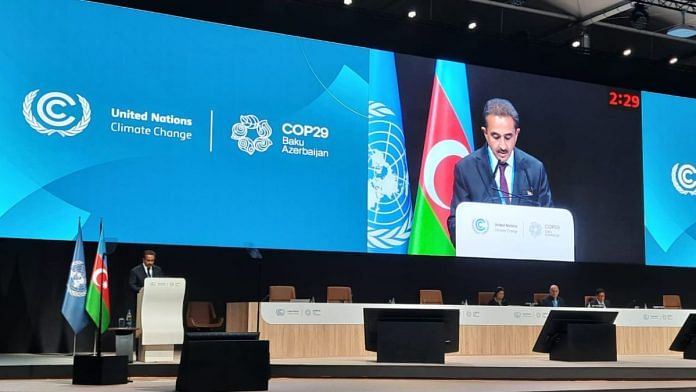
New Delhi: The new climate finance goal to facilitate climate action in the developing nations must be rooted in the principles of climate justice, India said Tuesday at the high-level segment of the UN Climate Change Conference at Baku, Azerbaijan, calling on developed nations to take the lead in reducing emissions and allow adequate carbon space for developing countries. Presenting India’s national statement at the 29th edition of the Conference of Parties or COP29, Union Minister of State for Environment, Forests and Climate Change, Kirti Vardhan Singh called all countries to put up a collective fight against climate change. “What we decide here will enable all of us, particularly those in the Global South, to not only take ambitious mitigation action but also adapt to climate change.
This COP is historic in this context,” Singh said. The minister also criticised the restrictive trade measures imposed by some developed nations, calling this attitude a “hindrance” to climate action in developing countries. COP29 started on 11 November, devoid of star power as many world leaders stayed away .

The primary focus of the climate summit this year, dubbed the ‘finance COP’, is to get countries to agree on a New Collective Quantified Goal—an international fund for developing nations to assist them in meeting their climate goals. In a statement delivered in one of the closing plenaries on 16 November, India criticised the unwillingness of developed nations to engage in discussions on climate finance and mitigation. India has also strongly resisted unilateral trade measures, including the European Union’s Carbon Border Adjustment Mechanism (CBAM), reiterating that it unfairly shifts the costs of climate action to poorer nations.
The CBAM is a tax proposed by the EU on energy-intensive products like cement, iron, fertilisers and aluminium imported from India and China. In its statement Tuesday, India highlighted that the high carbon emission development pathways—process towards long-term emission reduction—of developed nations in the past have left very little carbon space for the developing nations. Delivered India’s National Statement at COP 29.
Reaffirmed our position that decisions on this forum should be guided by the core principles of Equity, Climate justice and Common but Differentiated Responsibilities and Respective Capabilities provided in the UNFCCC and its Paris...
pic.twitter.com/IhId9KU3m8 — Kirti Vardhan Singh (@KVSinghMPGonda) November 19, 2024 “Despite not contributing to the problem, we in the Global South are bearing a huge financial burden on account of climate actions for mitigation on the one hand and losses and damages caused by climate change on the other, thus severely limiting our capacity to meet our developmental needs,” Singh said.
He added that these limitations have, however, not dampened India’s resolve and commitment to take ambitious climate actions. (Edited by Sanya Mathur) Also Read: What is Article 6.4 of the Paris Agreement adopted at COP29 & why climate researchers are sceptical var ytflag = 0;var myListener = function() {document.
removeEventListener('mousemove', myListener, false);lazyloadmyframes();};document.addEventListener('mousemove', myListener, false);window.addEventListener('scroll', function() {if (ytflag == 0) {lazyloadmyframes();ytflag = 1;}});function lazyloadmyframes() {var ytv = document.
getElementsByClassName("klazyiframe");for (var i = 0; i < ytv.length; i++) {ytv[i].src = ytv[i].
getAttribute('data-src');}} Save my name, email, and website in this browser for the next time I comment. Δ document.getElementById( "ak_js_1" ).
setAttribute( "value", ( new Date() ).getTime() );.














